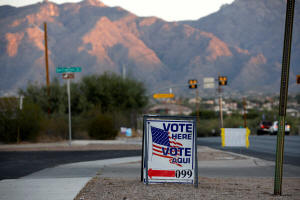U.S. Supreme Court signals more leeway for voting restrictions
 Send a link to a friend
Send a link to a friend
 [March 03, 2021]
By Andrew Chung and Lawrence Hurley [March 03, 2021]
By Andrew Chung and Lawrence Hurley
WASHINGTON (Reuters) - U.S. Supreme Court
justices on Tuesday appeared inclined to uphold two Republican-backed
voting restrictions in Arizona in a case that could further hobble the
Voting Rights Act, a landmark 1965 federal law that prohibits racial
discrimination in voting.
During nearly two hours of oral arguments by teleconference the court's
conservative justices, who hold a 6-3 majority, asked questions
indicating they could issue a ruling that would make it harder to prove
violations of the Voting Right Act.
The important voting rights case was heard at a time when Republicans in
numerous states are pursuing new restrictions after former President
Donald Trump made false claims of widespread fraud in the Nov. 3
election he lost to Democratic President Joe Biden. Republican
proponents of Arizona's restrictions cite the need to combat voting
fraud.

One of Arizona's measures made it a crime to provide another person's
completed early ballot to election officials, with the exception of
family members or caregivers. Community activists sometimes engage in
ballot collection to facilitate voting and increase voter turnout. The
practice, which critics call "ballot harvesting," is legal in most
states, with varying limitations.
The other provision disqualified ballots cast in-person at a precinct
other than the one to which a voter has been assigned. Voting rights
advocates said voters sometimes inadvertently cast ballots at the wrong
precinct, with the assigned polling place sometimes not the one closest
to a voter's home.
A lower court found that Arizona's restrictions, challenged in court by
Democrats, disproportionately burdened Black, Hispanic and Native
American voters. Democrats have accused Republicans nationwide of
pursuing voter-suppression measures to make it harder for racial
minorities who tend to support Democratic candidates to cast ballots.
Asked what the Republican Party's interest was in defending the
out-of-precinct rule, Michael Carvin, one of the lawyers defending
Arizona's measures, said that a ruling striking down the restrictions
"puts us at a competitive disadvantage to Democrats. Politics is a
zero-sum game."
At issue is the Voting Rights Act's Section 2, which bans any rule that
results in voting discrimination "on account of race or color." This has
been the main tool used to show that voting curbs discriminate against
minorities since the Supreme Court in 2013 gutted another section of the
statute that determined which states with a history of racial
discrimination needed federal approval before changing voting laws.

A ruling, due by the end of June, could impact the 2022 elections in
which Republicans are trying to regain control of the U.S. Congress from
the Democrats.
[to top of second column]
|

Sign directs voters to a polling station on Election Day in Tucson,
Arizona, U.S. November 3, 2020. REUTERS/Cheney Orr/File Photo

THE PROPER STANDARD
Much of the argument focused on the proper standard courts could use
to remedy voting discrimination. Conservative Justice Samuel Alito
suggested that, because poorer and less-educated people are likely
to be more affected by any voting rule, a standard allowing claims
based on statistics showing racial voting disparities is "going to
make every voting rule vulnerable to attack."
With an eye toward challenges against future voting curbs, liberal
justices probed the dividing line between lawful and unlawful
restrictions. Liberal Justice Elena Kagan wondered how the court
should examine those that obviously target minorities versus those
that are merely inconvenient.
Questioned by Kagan, Carvin said a hypothetical rule that would
require Black voters to travel to country clubs to vote would likely
be unlawful, but one restricting voting hours to traditional
business hours or banning Sunday voting would be lawful even if
evidence showed minorities would face greater difficulties.
Lawyer Jessica Amunson, representing Arizona's Democratic secretary
of state against the voting restrictions, said in a democracy
policymakers should want to increase voter participation.
"Candidates and parties should be trying to win over voters on the
basis of their ideas, not trying to remove voters from the
electorate by imposing unjustified and discriminatory burdens,"
Amunson said.

Some conservative justices appeared skeptical of the standard for
complying with the Voting Rights Act proposed by Republicans in the
case. Conservative Justice Amy Coney Barrett questioned Republican
arguments that a regulation that causes a burden on minorities
should not be invalidated if the electoral system as a whole is
fair.
"If it takes one opportunity away I guess I still don't understand
why that isn't reducing the ability of those voters to vote relative
to other white voters that don't share that same burden," Barrett
said.
Conservative Chief Justice John Roberts asked Carvin: "Why should
there be disparate results if you can avoid them?"
The argument also revealed a divide over whether voter fraud must be
documented before lawmakers enact laws to prevent it.
The San Francisco-based 9th U.S. Circuit Court of Appeals last year
found that the restrictions violated the Voting Rights Act, though
they remained in effect for the Nov. 3 election. The Voting Rights
Act was enacted at a time when numerous Southern states effectively
prevented most Black people from voting.
(Reporting by Andrew Chung and Lawrence Hurley; Editing by Will
Dunham)
[© 2021 Thomson Reuters. All rights
reserved.] Copyright 2021 Reuters. All rights reserved. This material may not be published,
broadcast, rewritten or redistributed.
Thompson Reuters is solely responsible for this content. |